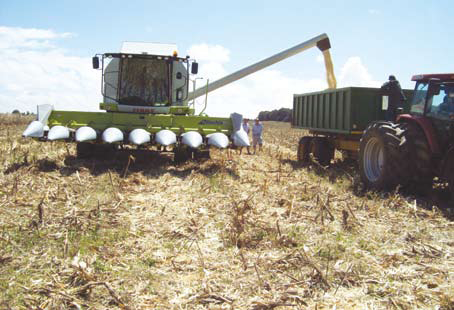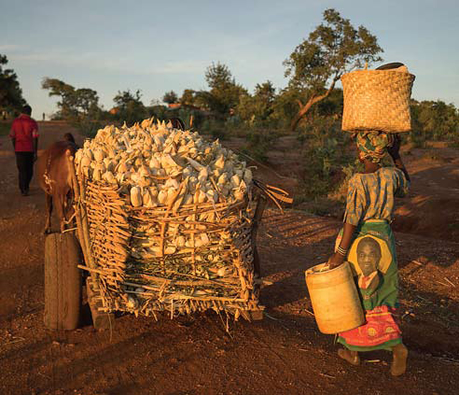The Biggest Challenge Facing Cereal Farmers

The cereal farming is entering into a period of rapid change due to famine, droughts and climate change. Nationally, crop production will increase, with minimal land expected to be cultivated. As these challenges continue to grow, so does the need for talented employees.
Therefore, good people management practices are critical to raising productivity and for adding value to the cereal industry. For farmers who have built up a strong business over many years and largely through working on their own, it will be difficult to change the mind-set to sharing power and giving responsibility to others. There is a real worry that farmers will burn out in this new era unless they effectively upskill on good people management skills. The industry must realise that it has to invest in people and realise that this is a long-term project.
“It takes two years to build a farm, it takes ten years to build the capacity in a person to run that farm” – (Interview -Stuart Taylor NZ)
How can cereal farming become the employerof- choice for the young people through the acquiring of people management skills, which farmers throughout the world regard as necessary? We are world class at cereal farming, why would we not strive to be world class employers and provide world class work places as well?
The role of a cereal farmer has changed over time. The physical work element has fallen significantly on the list of priorities, with farmers now needing to show more leadership and business skills.
“We think we plant crops, no we actually manage people” – (Growers)
To begin, a detailed analysis of the farm system and the people management skills of the farmer is necessary before expansion. All solutions need to be viable and profitable along with providing an attractive lifestyle to all involved. Simplicity is the ultimate sophistication.
Farmers need to understand the position that needs to be filled to better enable certain skill sets to be targeted and to set clear expectations of the new staff member, therefore, resulting in a clear plan with no grey areas going forward.
Technology is constantly evolving and is replacing much of the world’s workforce. It has the ability to make communication much easier and simpler and this can make a farm work.
Today staff want flexibility; they want routine, rostered time off with a fair and competitive remuneration. They want to be treated with respect, they want to learn, be part of something bigger and all within a positive and progressive atmosphere. Farmers should actively seek to understand an employee’s short, medium and long term goals and in turn help their employees achieve these goals through their work. One of the key things to have in mind is that bonuses are only a short term motivator, and operating bonuses will lead to an increased administration burden and become anticipated.
“Paying top salary doesn’t automatically attract skilled people who are committed to helping you reach your farm business objectives".
While staff turnover is inevitable, the ability to retain staff is one of the most underrated attributes of many successful businesses. Retaining quality people is about ensuring good employees stay in your business because they have interesting and rewarding jobs. It costs double a person’s salary to replace a member of staff therefore it is cheaper to invest in good people rather than replace.
Consistently underperforming or incompetent employees need to be removed immediately. These ‘bad eggs’ will have a negative impact on the culture and on staff morale. Farmers will need to know when an employee needs support to help them improve their performance, and when that employee needs to be dismissed. This requires leadership and a good understanding of people.
Conclusions
Technical ability and hard work will not be enough going forward to manage the modern farm. Good people management skills and leadership will be.
Cereal farmers have the ability to be the employers-of-choice for many, by providing the best working environments. This is dependent on whether they can get the training and education to develop their people management skills. In this way they can provide the leadership and the management skills that are needed to make farming more attractive to young people.
Clear, concise and continuous communication is key to successful management and achieving ‘Buy in’ from an employee. Farmers need to have a vision; they need to know what type of culture they want to create on their farm. Farmers need to understand their business goals to ensure they hire the right employees. Farmers need to set out work expectations, provide timely feedback and performance reviews and say ‘please and thank you’. This is essential if the industry is to take advantage of opportunities in the sector in the coming years.
View staff as an investment not as a cost to the business. For any business to successfully grow, people need to be the number one goal. Employers must stop giving lip service to the importance of employees within their business and put their words into actions.
Draw up specimen contract agreements, outlining the terms and conditions of employment.
Provide a framework within which employers and employee representatives can come together voluntarily and negotiate terms and conditions of workers in their respective sector. Pay rates, working hours and time off all need to be discussed openly and included in these discussions.
Learn farmers best practice through open days and discussion groups.
Provide a course in good practice in Human Resources so that employers can up skill.
As part of their in-service training days, supervisors need to be trained to identify staff issues, to critically examine employers own people management skills on farms and how to provide advice to both employers and employees to resolve any issues that may arise.

Farmers require an accessible online resource where all relevant tools and information to help them attract, retain, manage, and motivate staff are provided.
Suppliers and manufacturers need to work with farmers and provide them with Standard Operating Procedures relevant to their products or equipment.
Embrace technology. Platforms such as cloud based programs are an innovative way to share farm information such as farm maps and data between a farm team. Use a group messaging app to keep everyone on farm up-to-date with what is happening on farm.
Employers are required to look after employee’s health and safety on farm. Keep them safe from hazards, provide the necessary personal protective equipment and watch out for their mental health.
Today’s generation is much more interested in a work-life balance than previous generations and expect good terms of employment. Therefore, working hours, time off, rosters, and remuneration are all very important to today’s work force in agriculture.
Employers need to protect their reputation to safeguard their business. Look for attitude and honesty in employees, all other skills can be taught.
The ability to retain staff is one of the most underrated attributes of businesses. The cost of replacing staff can be up to twice their salary. Staffs are an investment in the business not a cost. Constantly train and up skill employees. It shows them they are valued but it also has a positive financial benefit to the farm.
Farmers need to manage their employees better, and if they do so, then their farms will be more productive and profitable